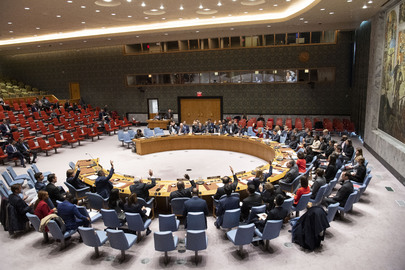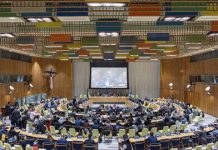“I deeply regret President Donald Trump’s decision to once again withdraw the United States of America from UNESCO,” Audrey Azoulay, Director-General of the Paris-based agency, said in a statement.
In New York, UN Spokesperson Stéphane Dujarric said that the Secretary-General joins Ms. Azoulay “in deeply regretting the decision by the United States.”
The US first withdrew from UNESCO in 1984 under President Ronald Reagan and didn’t rejoin for two decades. Fourteen years after re-entry, the first Trump administration withdrew from the organization in 2017, but the decision was reversed under President Joseph Biden in 2023.
Ms. Azoulay underscored that “this decision contradicts the fundamental principles of multilateralism,” and she highlighted that this decision would affect UNESCO partners in the United States, including communities seeking site inscription.
A White House press statement on the withdrawal said the decision had been taken to protect American interests from UNESCO’s work to advance “divisive social and cultural causes.”
The statement also said the organization is focused on the UN Sustainable Development Goals (SDGs), which it described as “a globalist, ideological agenda for international development at odds with our America First foreign policy.”
The statement also specifically cited UNESCO’s decision to admit the State of Palestine as a Member State as problematic, contrary to US policy and fuelling the United Nations’ “anti-Israel rhetoric”.
Ms. Azoulay in her statement denied these claims that UNESCO is “anti-Israel,” highlighting the organization’s work in Holocaust education and combating antisemitism.
“UNESCO is the only United Nations agency responsible for these issues, and its work has been unanimously acclaimed by major specialized organizations,” she said, including American organizations such as the United States Holocaust Memorial Museum in Washington, DC.
Diversifying funding in preparation
Ms. Azoulay stressed that this announcement was anticipated, and the organization has prepared accordingly, highlighting major structural reforms in recent years, including the diversification of funding sources.
“The decreasing trend in the financial contribution of the US has been offset,” she explained. Despite the US now representing eight per cent of the organization’s budget, UNESCO’s budget has steadily increased thanks to donations from member states and private contributors, the latter of which have doubled since 2018.
“Today, the Organization is better protected in financial terms,” she said.
Continuing US partnerships
“UNESCO’s purpose is to welcome all the nations of the world, and the United States of America is and will always be welcome,” Ms. Azoulay emphasised.
The organization will continue to work with its US partners in the private, academic and non-profit sectors, and it will pursue discussions with the US Government.
Source of original article: United Nations (news.un.org). Photo credit: UN. The content of this article does not necessarily reflect the views or opinion of Global Diaspora News (www.globaldiasporanews.com).
To submit your press release: (https://www.globaldiasporanews.com/pr).
To advertise on Global Diaspora News: (www.globaldiasporanews.com/ads).
Sign up to Global Diaspora News newsletter (https://www.globaldiasporanews.com/newsletter/) to start receiving updates and opportunities directly in your email inbox for free.





























